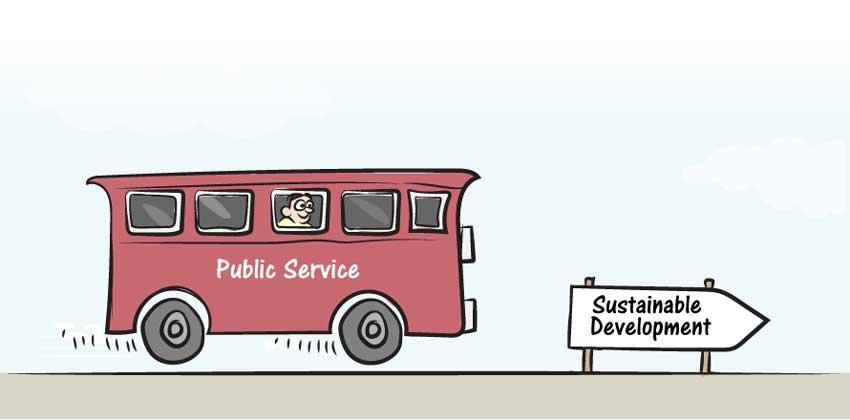Reply To:
Name - Reply Comment

Employees working for the Government service are often referred to as Government servants but in reality they are public servants because they are expected to serve the people sincerely, sacrificially and selflessly. How often this happens is a big question but we hope that with the ongoing socio-economic and political catastrophe we are undergoing, public servants will honestly serve the people, especially the poor and the lower middle class people who often come from remote areas. At present, they are not treated well and often are told to come back the next day or later. This means a severe problem for them financially and otherwise. Public servants need to remember they are paid from public funds.
On Thursday, the United Nations marked the Public Service Day with the theme being “Building back better from COVID-19 by enhancing innovative partnerships to meet the Sustainable Development Goals (SDGs)”. In a statement the UN says taking its lead from the 2022 theme of the UN High-level Political Forum (HLPF), the main body for reviewing implementation of the 2030 Sustainable Development Agenda, the 2022 Public Service Day focussed on the role of public institutions and public servants in building back better from COVID-19 as they work to meet the 2030 deadline for implementing the SDGs.
In particular, the event focused on one of the Goals that were reviewed at the 2022 HLPF: Goal 17 - Partnerships for the Goals, which works to ‘Strengthen the means of implementation and revitalize the global partnership for sustainable development’. During the UN Public Service Day event, stakeholders gathered to discuss the role that various forms of partnerships can and should play in building back better from COVID-19 and in meeting the SDGs. It did do so through the lens of SDG 16 (peace, justice and strong institutions), and in particular target 16.6 - enhancing the effectiveness, transparency, accountability of public institutions. The event placed the focus on the role of innovation in creating and sustaining partnerships for effective public service delivery.
According to the UN, on December 20, 2002, the General Assembly designated June 23 as Public Service Day by adopting a resolution. UN Public Service Day celebrates the value and virtue of public service to the community; highlights the contribution of public service in the development process; recognises the work of public servants, and encourages young people to pursue careers in the public sector. To bolster recognition of the Day and the value of public service, the UN established the UN Public Service Awards (UNPSA) programme in 2003, which was reviewed in 2016 to align with the 2030 Agenda for Sustainable Development. The UNPSA aims to promote and reward innovation and excellence in public services by recognising the creative achievements and contributions of public institutions that lead to a more effective and responsive public administration in countries worldwide in support of sustainable development. Each year UN organises the Forum with a host country, using the event to host capacity-development workshops, the UN Public Service Awards ceremony and a Ministerial Roundtable. Drawing together about 800 to 1,000 participants, the Forum is a space for world leaders, Ministers, and other senior decision-makers to debate emerging issues and trends, discuss good practices, strategies, accelerated actions, and innovative approaches for effective service delivery and transforming institutions.
In a message the UN Secretary General António Guterres says there is no higher calling than serving others. Each year on United Nations Public Service Day, we honour those women and men around the world who proudly dedicate their ideas, innovations and energies to serving their communities and humankind. As this year’s theme reminds us, public servants are increasingly working shoulder-to-shoulder with a range of local and global partners to drive recovery and sustainable development in their communities. From teaming up with the private sector on technological solutions to enhance public service delivery, to joining forces with civil society groups to better reflect a variety of voices across public policies, programmes and community responses, partnerships are critical to designing and delivering inclusive services. As we mark this important day, let us celebrate not only the work of public servants worldwide, but their commitment to working in partnership to build a better future for all people.